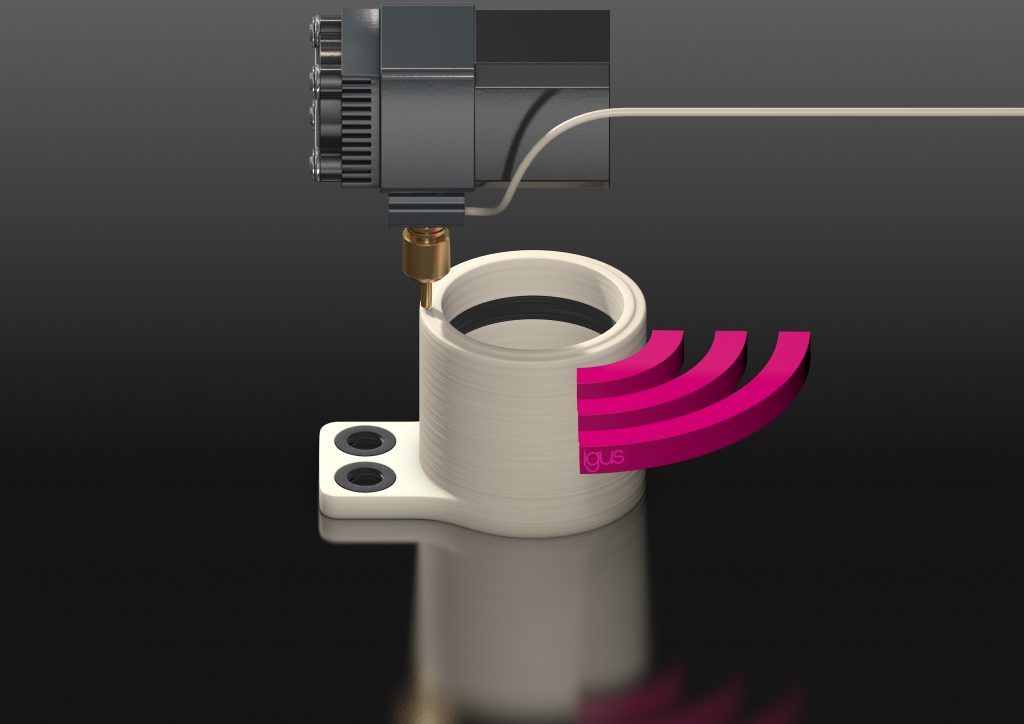Additive manufacturing meets Industry 4.0: igus makes 3D printed tribo-components intelligent
24/11/2020

Printed components made intelligent – this is the latest product development from motion plastics experts igus.
In this world first, igus can integrated sensors into its printed motion plastics components to predict maintenance requirements and avoid downtime.
igus, which has its UK headquarters in Northampton, has developed a special feature; sensors are directly printed into the parts which gives Industry 4.0 integration, and can be ordered and delivered both quickly and easily.
Matthew Aldridge, UK Managing Director of igus, the global manufacturer of energy chain systems and polymer plain bearings, said: “Our intelligent 3D printed bearing marks a real breakthrough, meaning maintenance needs can be predicted and overloads avoided.
“Long before any failure, the intelligent 3D printed component signals that a replacement will soon be required. It can also detect an imminent overload and prevent any further damage to the bearing and system.”
The latest industrial revolution, Industry 4.0, is encouraging the integration of intelligent production systems with advanced information technologies, of which Additive Manufacturing (AM) is considered an essential ingredient.
igus engineers have succeeded in combining both AM and Industry 4.0 in a single production step and for the first time, sensors are printed into the 3D printed tribo-component using multi-material printing.
Wear or load are monitored
igus has been producing intelligent wear-resistant parts for energy chains, plain bearings and linear guides since 2016.
Before this new product, igus could manufacture plain bearings from iglidur I3 using SLS, and then introduce intelligence as part of a second step, which proved complex and expensive.
Using a new process, igus developers are now able to produce intelligent, wear-resistant parts in as little as five working days, without the need for a second step.
The sensor layer is applied to areas of the component that will be subjected to load. Wear-resistant components with integrated sensors are created using multi-material printing and the components are manufactured from iglidur I150 or iglidur I180 filaments and a specially developed, electrically conductive, 3D printing material that bonds well with the tribo-filament.
Currently, two areas of application are possible:
If the electrically conductive material is located between the layers subject to wear, it can warn against overloading. If the load changes, the electrical resistance also changes. The machine can be stopped, and further damage can be prevented. To determine the load limits, the bearing must be correctly calibrated.
If the conductor track is embedded into the sliding surface, the wear can be measured via the change in resistance. Predictive maintenance is possible, avoiding system downtime.
Register for a beta test here: https://content.communication.igus.net/en/3d-isense-beta-tester
This is just one of many 3D printing innovations that igus is presenting this autumn. For individual and guided tours at the igus virtual new products trade show, and for further information visit: https://www.igus.co.uk/info/3d-printing-fair?L=en
The terms “igus”, “Apiro”, “chainflex”, “CFRIP”, “conprotect”, “CTD”, “drylin”, “dry-tech”, “dryspin”, “easy chain”, “e-chain”, “e-chain systems”, “e-ketten”, “e-kettensysteme”, “e-skin”, “e-spool”, “flizz”, “ibow”, “igear”, “iglidur”, “igubal”, “kineKIT”, “manus”, “motion plastics”, “pikchain”, “plastics for longer life”, “readychain”, “readycable”, “ReBeL”, “speedigus”, “triflex”, “robolink”, “xirodur”, and “xiros” are protected by trademark laws in the Federal Republic of Germany and internationally, where applicable.
